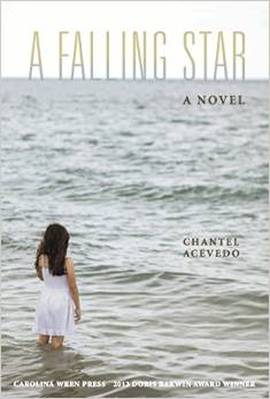 Thank you Chantel Acevedo for inviting me to take up the Chocolate Challenge: three books, three reviews, three types of chocolate. And with my sweet tooth…chocolate is the best way to describe some of the delicious books listed below! You can read Chantel’s take on the challenge on her web page ihola and you can also follow her on Twitter @chantelacevedo. Check out her new novel, A Falling Star, published in August 2014 and her novel, Love and Ghost Letters. DARK CHOCOLATE
Dark chocolate is often described as chocolate that has a somewhat bitter taste to it. Don’t get me wrong, it’s good, but it stays with you long after you consume it. That is why the first book I am going to mention is by the late, great Bebe Moore Campbell, 72 Hour Hold. This book has stayed with me since I first read it in 2005. At the time, I was struggling with debilitating depression, and I stumbled upon this book while trying to find something to distract me from my own struggles and maybe even inform me about some of the concerns I had about my own illness. This book accomplished both. 72 Hour Hold is the story of a mother, Keri, who is trying to come to terms with her daughter, Trina’s, struggles with bipolar disorder. Trina went from being a normal vivacious young person, to becoming a violent, disruptive shadow of her former self. This novel shows the true nature of this disease and how it not only affects the person suffering from it, but also the ones who love the sufferer. The reader gets to see Keri fighting her child, as she fights her ex-husband and a flawed system in order to insure Trina gets the help she needs. The reader witnesses Keri’s overwhelming love for her daughter and her willingness to do anything to get her daughter back. This book is not for the faint of heart. Bebe Moore Campbell doesn’t sugarcoat bipolar disorder and she doesn’t offer any easy solutions, hence the bitter chocolate taste that is left in the reader’s mouth after completing this well-written piece of fiction. It is a tragedy that Ms. Bebe Moore Campbell is no longer with us. Her voice is greatly needed.
0 Comments
 Sometimes, trying to push out the words of a new story or poem is just like trying to push out a newborn. The words get stubborn and comfortable inside the mind where they've been gestating for days, weeks, months, sometimes years. They cling onto the notion that they are safer if they stay wrapped up inside the uterus of the writer's mind. So, sometimes we writers need a literary midwife or two or three to coach us and coax that baby out. Somebody who'll stay with us and that story 'til the birthing process is done. Somebody who'll say, "Daughter, let those words go. Ain't you tired of carrying that full-term baby around in your belly? You are? Then bear down, baby. Bear down and push that baby out." I am in the wonderful, scary space of completing my second novel. The bearing down and pushing out of the words has, at times, been difficult, but thankfully, I have a village of literary midwives who are constantly encouraging me and pushing me to birth this baby out. So, today, I honor them. They know who they are. Love.  The only thing separating them from me is I got lucky. The only thing separating them from me is I got lucky. The only thing separating them from me is I got lucky. The only thing separating them from me is… Today, I walked into a prison for the first time in my life. I didn’t know what to expect. I didn’t know if the women would be hostile. Violent. Mistrusting. Accusatory. Apathetic. I didn’t know. I was excited to be there with them, but I still prepared myself for the worse. I prepared myself to face a room full of angry women who resented my freedom to come and go as I pleased. I imagined a classroom of women shackled and chained by the choices they made that led them to a life of incarceration. I imagined a cross between Orange is the New Black and Shawshank Redemption. I tried to prepare myself for the fact that these women would be nothing like me. Nothing like me. Nothing like me. The only thing separating them from me is I got lucky. The only thing separating them from me is I got lucky. The only thing separating them from me is I got lucky. The only thing separating them from me is… I looked each woman in the face. Smiling faces. Hopeful faces. Faces similar to the fresh faces I see each time I teach at the University. I heard names like Denise, Angel and Amy. Names that didn’t inspire fear. Names that implied they could have been doctors. Lawyers. Teachers. Names that didn’t convey poor choices. Names that any of us could bear. The only thing separating them from me is I got lucky. The only thing separating them from me is I got lucky. The only thing separating them from me is I got lucky. The only thing separating them from me is… I saw women with tattoos that mirrored my own. Nothing scary. Just names of babies. Names of boys they thought would love them to infinity and beyond. Images of loved ones gone but not forgotten. Birds. Hearts. Bible Verses. I heard women tell stories similar to my own – stories of abuse, self-loathing, and anger. I saw regret in the eyes of women who knew there would be no do overs. I saw women who, under normal circumstances, would be my colleagues. My next door neighbors. My best friends. My sisters. My aunts. My mothers. I heard women with life sentences speak about dreams for the future. I looked in mirrors and saw me looking back. The only thing separating them from me is I got lucky. The only thing separating them from me is I got lucky. The only thing separating them from me is I got lucky. The only thing separating them from me is… I saw women whose psyche was sometimes so fragile they hid from the night like it was an abusive lover. I, too, fear the night sometimes. I, too, wonder will that elusive sun really come out tomorrow. I saw graceful movements. I heard lyrical voices. I saw beautiful flowers I wanted to rescue and take home with me so they could stretch towards the light and grow the way they were meant to grow. Only grace and good fortune allowed me to say my good-byes and walk outside into the light, but, before leaving, I promised. I’ll be back. I won’t leave and unremember you. I’ll be back. I promise you, I’ll be back. The only thing separating them from me is I got lucky. The only thing separating them from me is I got lucky. The only thing separating them from me is I got lucky. The only thing separating them from me is… 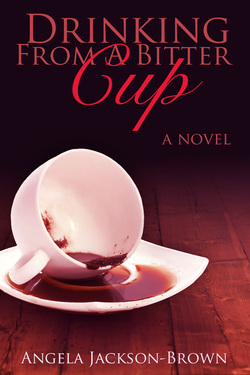 Don't forget to join me today as I discuss DRINKING FROM A BITTER CUP with DuEwa Frazier on her radio show, Rhymes, Views & News Talk Radio ! The show begins at 1:00 pm EST. Click here on the link to take you there! See you on the radio! If you would like to buy a copy of DRINKING FROM A BITTER CUP, go to Amazon, Barnes and Noble, or Books A Million. 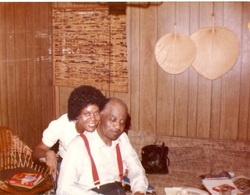 Mom and Granddad (I never got to meet him) Mom and Granddad (I never got to meet him) By the time I turned 16 and started looking for my birth mother, I was angry. I was suffering from “mommy abandonment issues” and I wanted to find her so I could punish her. I’m not proud of that fact, but it is the truth. I’m thankful I did not find her then. Emotionally, I was not ready for a relationship to begin between the two of us and I’m afraid, had I found her, things would have quickly fallen apart between us. So I say with gratitude, my journey to find my mother was a slow process with a ton of road blocks in the way. I started my search before there were computers like we know them, so my process involved writing letters and making phone calls. On my adoption papers it said her name was Gwendolyn English and I was born in Montgomery, AL. That’s all I had to go on. For some reason, since I loved English so much as a subject, I just knew she and I were destined to meet one day. In my heart, I knew it was just a matter of time until I found her. But all of my searching seemed to lead towards more and more dead ends, and there were so many monumental events that took place that I wanted her to be there to witness. My high school graduation. My marriage. My graduation from college. My son’s birth. My divorce. My stroke. Yet, it was almost another twenty years after I began my search at age 16 before I found the woman on my birth certificate – Gwendolyn English. I remember walking to her door, anxious, even though she said she couldn’t wait for me to arrive. When she hugged me for the first time in my adult life, I felt like I had come home. My adopted family, especially my daddy, meant everything to me; I was thankful that I grew up a member of the Jackson family. But she was always the missing component. And then I found out that I had siblings, and having grown up an only child, I felt blessed beyond measure. Not to mention all of the fabulous aunts, uncles and cousins I inherited. My life was moving toward completeness. A few months ago, a television show called “I’m Having Their Baby” aired, and it became a source of conversation for the two of us. The show was all about women who made the decision to give up their babies for adoption. One day my birth mom said, while we were discussing the show, “I wish I could talk to those young women and tell them how difficult it is to give up a baby.” Shortly after she said those words, I approached her about doing this interview with me. I think she was a little hesitant at first, but eventually, she and I made the decision to share part of our story. So, here it is. My interview with the woman who birthed me into this world and set me free for just a little while – Gwendolyn English Pendleton. Hi, Mom. Tell me about that first year after the adoption. I didn't handle the first year very well. In fact, I was nearly a basket case. I was determined to keep the adoption a secret, leaving me with no one to talk to, and at the time, I didn’t have God in my life, so I truly felt lost and alone. When I was little, I used to pretend you were a Queen in a far-away kingdom, and one day, you would come and find me. What are some of the dreams you had about me and my whereabouts? In my dreams of you, you were always an adult. I never saw you as a child. And when I did dream of you, I didn’t find you in the dream, you always found me. You were at the front door of the house. I never saw myself taking you from your adopted family. It would have been the wrong thing to do. My dream was seeing my daughter as a young lady, knocking at my front door. And, it almost happened just that way. You mentioned that after you put me up for adoption, you went back looking for me. What was it like for you when you found out I had been adopted? It was sad and then again, it was almost a relief that you had been adopted early and you weren’t stuck in a dreary orphanage, like the ones in the movies about abandoned children. You were such a beautiful baby. I did have some mixed feelings when I found out you had been adopted though. I was happy for you, but I was also disappointed because my deep desire was that I might reclaim you. However, I realized that getting you back would have been a difficult task since I had already signed away my rights. Another part of me decided that my baby was in a good home and I should allow her to grow up there. This decision finally gave me a level of peace. In what ways did the adoption affect your relationship with my sister and brothers? It made a difference when they were older and their father and I divorced. Having given you up, I knew I would not allow another child to get away from me. It made me want to hold on to them more. The adoption, I believe, caused me to be a stronger mom, and a more determined mom who would fight to keep my other children and not let anyone take them out of my arms. Describe what your first thoughts were on that day I called you for the first time. That day you called, I knew who you were before you even said your name, a name that I chose for you – Angela Denise. I knew your voice. It was our voice. And when you said your name I thought, God did just what he said he would. He brought my baby home!! It was a miraculous moment. It was glorious. It was awesome. Because my adoption was a secret to most members of our family, how did you deal with my sudden re-appearance into your lives? I called the family together and told them the truth. They were so wonderful and so understanding. I'll never forget it. I thank God for all my babies and my other family members. You and I have spent the last 13 years trying to get to know each other. What has been some of the challenges? And what has been some of the great moments? We need to be seeing each other more – that’s the challenge. The great moments were the very first time I saw you as a young lady and every time I've seen you since. The challenge has only been the physical distance between us. If you could give advice to mothers contemplating adoption, what advice would you give to them for surviving those years apart from their child? To be honest, I have no advice to give. Every woman must decide for herself what the right decision is for her. Fortunately, I came through by the grace of God. I know that God allows us to go through things for spiritual and mental maturity, even when we bring these things on ourselves. Would I make that decision to give up my baby again? I don't know. I'm not that person anymore. She was only 19 and very confused. I don’t believe I would do it now, knowing what I know. How do I know I wouldn’t give up my daughter – give up you? Because I'm stronger and wiser, and I know that I wouldn't have to go through it alone. Mom, thank you for doing this interview with me. We’ve been through a lot together, both when we were apart and now that we are in each others' lives again. Let me say what I have said before, I have no regrets. I was loved. I was nurtured. I made a difference in the life of my parents who really wanted me. You did the right thing. If you would like more information about adoption, visit the National Council for Adoption website by clicking here. If you would like to read more blog posts by me, visit my blog, “Writing in the Deep” by clicking here. Thank you for visiting my blog. Don't be a stranger. 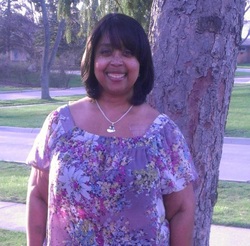 Tracy Butler Tracy Butler Although I met many of my birth family nearly 13 years ago, my cousin Tracy and I have only “met” over the telephone, via Facebook, and through email exchanges. Yet, even though we have never had a face-to-face meeting, we have clicked just like cousins who had the good fortune to grow up together, sharing summer vacations filled with silly little secrets and long walks down Alabama dirt-filled roads. Over time, my cousin, Tracy, has shared her story with me. Let me just say, Tracy’s story is phenomenal – just like her. I asked her would she be willing to share it with others on my blog. I am a firm believer, like Good Morning America’s host, Robin Roberts says, “Our mess can become our message.” Tracy has had to overcome a lot of “mess” over the last few years, but she has never lost hope or faith that her tomorrows will be better than her yesterdays. So, here is my Cousin Tracy’s story. May the readers of her journey be as positively touched and helped by her words as I have been. BIO Tracy English Butler is 41 years old and the married mother of six children. Her children range in age from 18 to 10 (the ten year olds are twins). Tracy says she never envisioned herself as having such a large family. Instead, she thought she would be a full time career woman. But Tracy is the first to say she has no regrets and loves every part of being the mom to her amazing, beautiful family. As a child, Tracy grew up in an upper middle class neighborhood with two loving parents, Edward and Jean English. She has one sister, Kelly English Quirolo, and a whole host of loving aunts, uncles, and cousins. Tracy and her husband, Mario, have been married for 19 years, and when asked the secret of their long lasting relationship, Tracy says, “Running our household and raising six children has been a task requiring endurance, love, compromise, and understanding.” All of their children are in school full-time and about a year and a half ago, Tracy returned to school herself to get a graduate degree in counseling. Tracy was accepted to a challenging program at her Alma mater, Oakland University in Michigan, and was breezing right along carrying a 3.9 grade point average when all of a sudden she was stopped in her tracks by some devastating news. Here is the rest of Tracy’s story. Hi, Tracy. Thank you for agreeing to take our private conversations public. I truly believe your story has the ability to change lives. If you don’t mind, will you tell my readers what happened to you nearly two years ago that brought you and all of your carefully laid plans for the future to a temporary, screeching halt? Well, Angela, I found out that I had a brain tumor. The technical name for it is a Meningioma. Ninety plus percent of the time Meningiomas are benign which leads many people to think it is not that serious. Well, it is very serious, as the brain is a very delicate and complicated structure and any type of tumor that is pressing on it is therefore pressing on brain tissue or other delicate structures. Wow, Tracy. So what were the particulars of the Meningioma you suffered from? In my case, my Meningioma was on the left side of my skull. It was wrapped around my carotid artery and it pressed against my optic nerve. I went through a 10 hour craniotomy and I now have a titanium plate AND screws in my skull. Thank God my tumor is benign, but I have still endured the most difficult time of my life. What are some of the effects you’ve experienced as a result of this brain tumor, and has there been anything positive to come out of this situation? Everything about me is different. I have a right leg that slightly drags and it gets worse when I am fatigued. My speech is affected at times and I suffer from a fatigue that is indescribable. Cognitively I am not the same. I skip words when I talk and I forget that I have said things so I will often repeat myself. Yet, all of the changes in me have not been negative. I have conquered and faced many fears I never thought I would be able to. I am more vocal now and am in charge of my medical files and treatment. I realized quickly that doctors are blessings but they are not GODS. I am still healing even a year later as the tumor was removed in July of last year but I am here and able to tell my story and best of all, I am still blessed to be able to enjoy life with my husband Mario, my children, my family and my friends. You’ve also conquered another great hurdle, Tracy. Every time I hear the story, I am amazed. Would you share with my readers what that great hurdle was? Well Angela, as you know, over the past year I have lost over 147 pounds. Cousin, no matter how many times I hear the story, I continue to be astounded that you battled a brain tumor and weight loss…all around the same time! If you don’t mind, please tell my readers how you did it? Over the years I had tried diet plan after diet plan. Weight loss was constantly on my mind. I wanted to fit in and not loathe going shopping because nothing fit. I spent my younger years being told "you have such a pretty face, if you would just lose weight." The whole weight issue has been a very hurtful part of my life. In school, I was the last to get picked in gym, and through the years, people would not be-friend me because of my weight. Throughout my life, I have been bullied and teased. Finally, I made the decision to have weight loss surgery called the Gastric Sleeve, whereby 85% of my stomach was removed. I had the surgery done about six months before I found out I had a brain tumor. In my surgery, there was no re-routing of my intestines or creation of a pouch or new stomach. I am now only able to eat about 1/4 of what I used to eat at one sitting. I am not promoting this surgery or encouraging anyone else to have it done, but I will say this about it. The surgery saved my life and I couldn't be happier in this department. I still have about 40lbs to lose to be at what is considered a normal weight, but to tell you the truth I feel comfortable right now at the weight I am. Some people believe having weight loss surgery is taking the easy way out but I can say with all honesty, it is not! I still must choose healthy foods to eat and incorporate exercise into my daily routine. Tracy, you are truly an inspiration. Although you haven’t mentioned it yet, you have other health issues that have slowed you down some. What are they? I have Rheumatoid Arthritis, Chiari Malformation, and chronic anemia caused by a deficiency in the blood called G6PD. I also suffer from osteoarthritis and two bulging discs in my neck. I know it sounds like a lot of health issues but I am just trying to manage things one condition at a time. And Tracy, let me just say, you are doing a phenomenal job managing everything, including, a new career. But Tracy, let’s be frank. A lot of people would have said, after dealing with just one of the things you have dealt with, "Okay, I give up." But you never did. What kept you motivated to not stop? I have had many, many days when I have just wanted to crawl into a hole and never come out of it. But, I keep my mind busy by reading each day and speaking with and keeping in contact with friends and classmates from school. I gladly accept help from my family and others who offer. But most of all I hold my head high. On the days I am in a lot of pain I pray, spend quiet time outside in nature by walking slowly around my neighborhood and I pray some more. And, as you mentioned, I have even begun my own business. I am an Avon representative! Running the business is helping me in the cognitive areas that I am struggling with and it also allows me to stay engaged with others. Lastly, Avon is providing a secondary source of income for my family, despite my disabilities. But why Avon? What drew you to that particular company? Avon is a company that has successfully been in business for over 100 years, and Avon representatives have the flexibility of running a small side business or build something larger. I love that the prices are reasonable and I personally use many of the products myself. Also, I love working for a company that sells itself. Everyone knows Avon! My memories of Avon representatives are those ladies who used to come door-to-door. Has Avon changed from that model at all? There are still representatives who operate their business door-to-door only. But then there are those representatives who prefer to run their business online. Either way, running an Avon business requires getting the word out; whether it is through passing out brochures or establishing a web presence. I try to do both. Each campaign, I try to canvas my neighborhood with books and I try to reach new clients online. Recently, I began a Facebook Business Page called Avon Beauty. For example, even though you and I are in different states, separated by hundreds of miles, I am still able to be your “Avon Lady” through my website. The online component of Avon is what has taken it from being your grandmother’s Avon to what it is today, not to mention the fact that the products have also evolved over time. All in all, Avon is the same in some ways, but different in all the ways that count. Well, I must confess, cousin. I do love getting those boxes with all of my neat Avon products every few weeks. Especially the products for my feet! (Laughing) Yes, I know. Well, Tracy, thank you for sharing your story with me again and with my readers. As I said before, your story is remarkable, and I would say that even if you weren't my cousin. I truly believe others will be as touched by your story as I was and continue to be. Thank you, Angela. Readers, if you would like a chance to win some incredible Avon products, leave a note for Tracy below and automatically, you will be entered into a drawing for a gift bag valued at $25. The winner of the gift bag will be announced on her Facebook Avon Beauty page on September 22, 2013. I will also announce the winner here on my blog. Click here to subscribe to her Facebook page. If you have additional questions about Avon or Tracy’s story, you can email her at [email protected]. If you enjoyed this interview and would like to read more like it, please subscribe to my blog on the right side of the page! Take care. 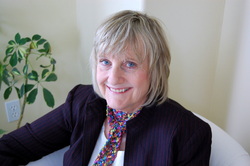 Karen Jones Gowen Karen Jones Gowen Full disclosure: Karen Jones Gowen is my editor at WiDo Publishing. Second full disclosure: Karen is the author of five books, including a cookbook. For those who know me, I do not cook with recipes. They intimidate me. Give me more than three ingredients and I am OVERWHELMED, not to mention, I am 95% vegetarian (I eat fish maybe once or twice a month, making me a pescetarian) so it isn’t always easy for me to find simple, delicious recipes without meat or meat products. However, Karen’s book, Farm Girl Country Cooking: Hearty Meals for the Active Family, did not intimidate me at all. Her recipes are wholesome and filling, and quite a few of them are already vegetarian based, like her recipe for Veggie Bake (It has only FOUR count them FOUR main ingredients, y’all!). But for all you meat lovers, fear not. There are plenty of great recipes for you, from what I’ve been told, like her Cajun Pot Roast and her Slow Cooker Boneless Pork Ribs. However, before we talk about Karen’s books and her publishing endeavors, let’s begin at the beginning. Karen Jones Gowen was born and raised in central Illinois, the daughter of a Methodist minister from Indiana and a school teacher from Nebraska. Karen has what one would call down-to-earth Midwestern roots. She attended Northern Illinois University in DeKalb and then transferred to the University of Illinois in Champaign–Urbana. After converting to Mormonism at the age of 20, Gowen transferred to Brigham Young University in Provo, UT, where she met her future husband, Bruce Gowen. She obtained her degree at BYU in English and American Literature. Karen and Bruce have lived in Utah, Illinois, California and Washington, currently residing near Salt Lake City. They are the parents of ten children. Not surprisingly, family relationships are a recurring theme in Gowen's writing. Karen, thank you for agreeing to do this interview. Let me just jump right in. There are so many amazing cookbooks on the market, what distinguishes Farm Girl Country Cooking: Hearty Meals for the Active Family from the rest? Farm Girl Country Cooking comes from years of planning menus and cooking for a large family, and from having to find recipes that feed a lot of hungry appetites without taking all my time and money. So many recipes now are too fancy and take too much time, plus using specialized ingredients that require extra cash. Teenage boys only care if a dish on the table tastes good and fills them up. And what I cared about was that they got a nice balance of vegetables and whole grains, with less meat, which is expensive. That’s why many of the recipes in my cookbook are easily adapted for vegetarians. We usually had three or four meatless meals each week. And I know how hard it is to decide what to make with what, as I still struggle with that when I need to make a dinner for more than just my husband and me. So I linked up main dish, side dishes and even dessert to give ideas to my readers. I experimented a lot before we went to press with what looked and tasted good together and what could work well when time was short. Did any of your recipes come from other sources besides your experimenting and having fun in the kitchen? Yes. I had so many recipes and meals that were part of our family history, you might say. Things my mother and grandmother had made that I’d used with my children, along with recipes I developed that were our family favorites. I wanted to combine them in one published cookbook, and in the process maybe help others who struggled to plan meals every night. Karen, let’s shift gears a little. I want my readers to know that you are a writer who wears multiple hats. My first introduction to your writing was through your fiction. So I wonder, of all of the writing you do, from fiction to cookbooks, is there one genre you enjoy better, and if so, which? I definitely prefer writing novels. Uncut Diamonds and House of Diamonds were both autobiographical novels, and then I did Lighting Candles in the Snow which was complete fiction. I felt like I’d crossed a threshold with Candles, as it dealt with addiction, a dysfunctional marriage and divorce—three things I thankfully had no personal experience with. I had to do research, and when readers who had dealt with these issues said it struck true to them, it made me feel like I had gotten it right. I’d love to write more novels about things I know nothing about, because it’s so rewarding to get into a completely different perspective. So, I have to ask. You have written Farm Girl, Uncut Diamonds, House of Diamonds, Lighting Candles in the Snow, and your cookbook, Farm Girl Country Cooking: Hearty Meals for the Healthy Family. Do you have a sixth book in mind? I’m currently working on a novel about a woman who experiences a traumatic experience at work and is subsequently paralyzed by fear. She has a drastic plan to overcome her fear but before she can implement it, she gets in a terrible accident that puts her in a coma. It is tentatively called “Waking Up,” due to be published next year. After that I want to write another in the Diamond series, which will be #3 in my Mormon family saga. Not sure of the title yet, although my husband says it should be called The Baseball Diamond. Haha! Not likely. I know the story behind how you got into the publishing industry has been fully discussed in your blog post called “The Truth about Farm Girl”; however, would you mind sharing just a little of that story with us? In my family, we like to say that while some publishing companies launch a book, in WiDo’s case, it was a book that launched a publishing company. That book was Farm Girl, a folklore history I wrote to honor my mother on her 90th birthday. I had no idea it would lead to the creation of a traditional book publishing company that has released 40 books. Karen, I teach full-time, write, and have a family, and most times, I’m overwhelmed by it all. How are you able to balance being a wife, mother, writer and business person? This is extremely difficult, because writing uses the creative side of one’s psyche while business uses the competitive, analytic side. However, I’d have to say that any writer today has to deal with this disconnect of the creative vs. the business. As writers we must promote ourselves and our books if we want to find readers in today’s hugely competitive market. Personally, I have to schedule my writing time and set weekly and monthly goals, or I’d never get any books of my own out. Your son William Gowen, is the CEO of WiDo Publishing, and your husband Bruce is the business manager, while you are managing editor. What is it like to work with your family? The first few years of WiDo’s existence consisted of numerous family members working together to implement this huge idea, along with the financial support of our generous and anonymous investor. Our son Don did the typesetting and covers; our daughter Liesel was an editor; William (we call him Billy) was an insightful decision-maker as well as an excellent editor; and other family was involved as well in various capacities. It wasn’t until early 2012 that we branched out from using only family, who really needed to devote more time to their own jobs and interests, to hiring freelancers. I have thoroughly enjoyed working with my husband and children to build something that has made so many writers’ dreams come true. Being a family of readers and book-fanatics, it’s incredibly rewarding that we have had this opportunity to publish so many wonderful books. What are some of your dreams for the future of the publishing house? Next year, 2014, we will reach the huge milestone of having published 50 books. It hardly seems possible since we went from 2007 – 2010 basically learning the ropes while publishing only a few books. We are forever grateful for the authors who took a chance on us early on, like William Everett Prusso (Ghost Waves, 2009), David J. West (Heroes of the Fallen, 2010), and Tamara Hart Heiner (Perilous, 2010). We barely knew what we were doing back then, yet these writers stuck with us during the extremely long editing and publishing process. Our time now from submissions to release is cut by about half what these good people had to endure. In addition, since 2009 the entire publishing industry has been going through a tremendous overhaul: from POD to ebooks to bookstores closing to the rise of self-publishing and of social media marketing. Many publishers, large and small, went out of business during that time, and I can hardly believe our little company survived it all and has even thrived. We are getting more submissions than ever and look forward to the 100 books released milestone. We see our immediate future being to continue the current pace of publishing an average of 12-15 books a year, supporting our authors along the way from editing to book release and beyond. Within the next five years, we’d like to double our yearly output to releasing 24-30 books a year. We also plan to integrate more aggressive online marketing campaigns for all of our books. At this moment, what type of authors are you seeking? We really love the enthusiastic authors who are excited about learning everything they can about navigating this great new world of online book marketing. In today’s bookselling world, it is the writer who is the face of the book. Readers could care less who the publisher is; instead, they’re often attracted to a book by who the author is. Writers can no longer stay in the background, quietly and anonymously writing. They’ve got to get out there and pull in their readership. It can be difficult since most writers are introverted, even reclusive, but the good news is that social media is the ideal vehicle for the reclusive writer to build a platform that also builds relationships with potential readers. For some of our authors, it comes easily and when they submit to us they have a solid platform already in place. For others, it’s brand new, with a definite learning curve until they can comfortably navigate social media. We like people willing to learn, to give their books the best chance of success by putting themselves out there, whether in person or online. And we will guide them and support and assist them along the way, because both publisher and author have the same goals: to put out a quality product that will attract readers and sales. We also like writers who are flexible and willing to work with their editors, willing to accept certain changes in their work or their ideas of what the cover or title should be in order to make the book more marketable. We try to be flexible too; because we want our authors to love their books as much when they’re published as they did when they finished the last draft and sent it off to submissions. What is one piece of advice you would give up-and-coming writers whose goal is to be a published author? Write, write and write some more. Write everything, not just books. Write like your life depended on it, because you won’t have a career as a writer if you don’t. You’ve got to love the whole idea and process of writing, despite the no money and the bad prose and the rejection and failure and discouragement. The more you write the better you will be, until one day you have the completed manuscript that someone outside your family and friends will love and want to invest in. Thank you, Karen. So readers, if you enjoyed reading about Karen and her many adventures in the publishing world, leave a comment and THE FIRST THREE people to leave a comment will receive an autographed copy of Karen’s book Farm Girl. If any of you readers or writers would like to learn more about WiDo publishing, click here. 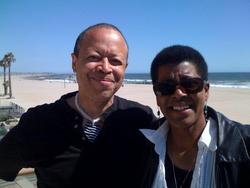 Authors Steven Barnes and Tananarive Due Tananarive Due (tuh-NAN-uh-reev DOO) is an American Book Award-winning author and the author, co-author and editor of over 15 books. She is the Cosby Chair in the Humanities at Spelman College in Atlanta, Georgia and currently, she and her husband, award winning science fiction writer, Steven Barnes, are producing a film based on their co-authored book, Devil’s Wake. 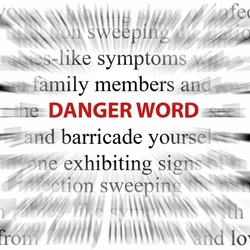 Short film based on the novel DEVIL'S WAKE. Thank you for agreeing to do this interview. I have made it no secret to my friends, family and strangers that you are one of my favorite writers, so I appreciate the opportunity to ask you a few questions. You’ve said in other interviews that you wanted to be a writer from the age of four. At what point did you make the decision that you wanted to write science fiction? I have written a bit of science fiction, but I see myself more as a dark fantasy or supernatural suspense (horror) writer rather than a science fiction writer. They are all in the family of speculative fiction; however, I remember being drawn to stories of space exploration and talking cats when I was a very young writer in elementary school. All children imagine stories of the fantastic, but it was hard for me to let them go when it was time to be a “grown-up” writer and take workshop courses at Northwestern University. My storytelling in the mimetic universe was very stale compared to my stories of the fantastic. For some reason, I become more deeply engaged in stories that are examining reality through the lens of metaphor. If we had the opportunity to eavesdrop on your writing process, what would it look like? What are your rituals and practices for creating your great stories? The most important element, perhaps, is music. I don’t always remember to listen to music when I need to write, but especially with a longer project like a novel or screenplay, nothing plunges me into “flow” state faster than a writing soundtrack. I create a specific soundtrack for almost every long piece of fiction I write. When I wrote Joplin’s Ghost, I listened obsessively to Joplin’s ragtime. When I wrote My Soul to Keep, I listened to a lot of early Louis Armstrong and world music. For post-apocalyptic zombie series, I prefer classic horror movie themes and epic, frightening themes and driving beats from musicians like Nine Inch Nails. Every long writing project has a music story behind it. It can be especially painful with screenplays, since I have yet to have a feature produced, so if I happen to hear a song from the soundtrack later, I might feel fresh disappointment. In what way has teaching writing to others helped or hindered your own writing? Aside from most writers’ innate desire to help pass on the lessons that helped them develop into professionals themselves, I find that hearing my own philosophies reinforced in a classroom situation can often translate to better habits in my writing life. I’m currently the Cosby Chair in the Humanities at Spelman College which has been a blessing. I wanted to take some time to breathe and concentrate on the work I have neglected. I found it difficult to spend time writing screenplays because of the financial pressure on my writing to create income, so I have been concentrating more on screenwriting and even filmmaking. That has been the big surprise to come out of teaching. I am also shifting more toward short fiction, exercising muscles that don’t get used in the same way in the world of a novel. In some ways, teaching has enabled me to feel like a student again. It isn’t easy balancing career and family, but you and your husband, Steven Barnes, seem to have found a method for making it work. What advice would you give others who want to be successful writers but don’t necessarily “see” how they can balance everything? I love being married to another writer, but I have learned that it’s very challenging to balance just the financial side in a two-artist home. Teaching has created more stability in our lives, and Steve has developed a great line of self-help and writing courses he sells online at www.diamondhour.com. So there’s that piece, and that’s a major piece—sources of income outside of the art. Raising a young son is another challenge, with serious time demands. All parents have to strike that balance of nurturing the marriage, nurturing the children and nurturing their careers…and perhaps writers have to also try a bit harder not to let their eyes glaze over in a faraway land while their children are present. “Balance” is a series of course corrections, much more a journey than a destination. And at the core of that is the nurturing of self—diet, exercise, meditation—that often gets forgotten. I was recently at a women’s empowerment luncheon in Atlanta, and a speaker made a great point that we can’t forget to nurture our girlfriends too because they are there to help us navigate the more difficult times. That’s why it’s an unexpected thrill to find myself working with both my husband and best friend on a short film, since it’s a project in common that gives us plenty of excuses to exchange ideas and talk to each other. You and Steven Barnes have collaborated on numerous novels (the award-winning Tennyson Hardwick mystery series and now Devil’s Wake and its sequel, Domino Falls), and you have said that the two of you have developed a writing strategy that involves one of you writing the first draft rather than you writing collectively. How did the two of you decide to adopt that practice for co-writing? Having worked in Hollywood and co-authored novels with science fiction greats Larry Niven and Jerry Pournelle, Steve has been a collaborator for much of his career. I was new to collaboration. I never would have conceived of a process where two writers are virtually side-by-side as they work, and Steve introduced his collaborative practices with other novelists to ours. I take first draft in the Tennyson Hardwick series we write in collaboration with Blair Underwood; Steve takes the first draft in our YA zombie series, which is a blend of science fiction and horror. Another rule Steve taught me: someone always has to have the final say, and generally it’s the writer who takes lead on the first draft. In an interview with Lit Stack, you mention that Devil’s Wake was born out of a short story you wrote with Barnes. Do you have any other works that started out as short fiction but evolved into a longer work? Actually, yes—my second novel, My Soul to Keep, evolved from both a poem I wrote in high school called “The Eternal Man” and a short story I wrote later called “The Anniversary,” about a woman whose husband leaves her without explanation after ten years—but he has never aged, never gotten sick. Recently you announced you and Barnes would be working with director Luchina Fisher to produce a short horror film, Danger Word, based on the novel Devil’s Wake. Why did you and Barnes decide to take on this huge undertaking without the financial backing of anyone other than yourselves, friends, family and fans? I could write a dissertation on why we’re co-producing Danger Word, but I’ll distill it to the practical: I’ve had film inquiries about my novels since my first book was published in 1995, Steve and I have sold three drafts of a screenplay to a studio, and we have both had works fall in and out of option. The bottom line is, we want to live to see our work produced. I know too many writers, including Octavia Butler, who never lived to see it—and we both love film, so it’s an important milestone to us. Beyond that, I want to be an example to other writers, actors or would-be producers who are sitting on the fence and believe it’s too difficult to be a filmmaker. So many artists opened my eyes to the possibilities in independent and short films--Ava DuVernay (I Will Follow, Middle of Nowhere) and emerging artists like Bree Newsome (Wake) and Keith Josef Adkins (The Abandon—a web series pilot). And I can’t forget the influence of Luchina’s short film in 2011, Death in the Family, which also truly inspired me. Once you see a string of others walking across the tightrope, you believe you might be able to walk up there too. Lastly, I know the impact of film and television. I remember watching Diahann Carroll as “Julia” and being fascinated by her son, Corey, who might have been the first black child I saw on TV. I remember how special it was when my family gathered to watch The Cosby Show, and how breathtaking Star Wars was. Those images are important nutrients. Danger Word is a zombie film on the surface, but I look forward to creating a visual blueprint that will help teach our girls to be strong. If readers would like to support the making of Danger Word, what can they do? What are some of the incentives for donating (other than supporting an amazing short film)? Our first fundraising deadline is May 25, when our projected shoot begins, so it’s a huge help just to pass the word and subscribe to our website: www.dangerwordfilm.com. We also have a Facebook page and a Twitter page: @ZombiesFreak on Twitter. But the bottom line is, we have a little over $5,100, and our production goal is $15,000. That’s a long way yet to climb. We’ve learned a great deal after observing Kickstarter and Indiegogo campaigns, and as a donor to other projects, I know how important it is for donors to feel recognized. We offer social media shout-outs, website listings, T-shirts, digital downloads, DVDs, a chance to be a zombie—all the way to a genuine producer credit on IMDb.com. Thank you Tananarive Due. Good luck with the film and all of your upcoming ventures. Thank you! |
Archives
March 2021
Categories
All
Blog Roll
|

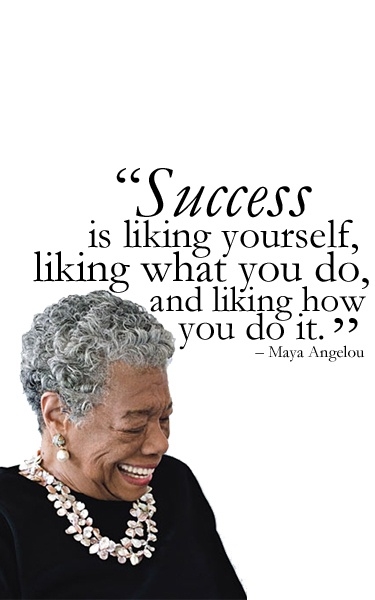
 RSS Feed
RSS Feed







